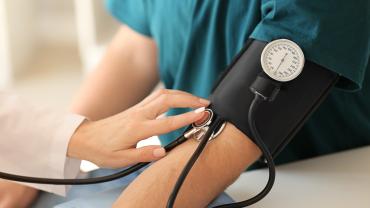
Nitric oxide (NO) is recognized as one of the most important molecules produced by the body. It was named “Molecule of the Year” by Science in 1992, and in 1998, the Nobel Prize in Physiology or Medicine was awarded to the three U.S. scientists responsible for its discovery. Nitric oxide is a messenger molecule that plays a role in nearly every organ system in the body, regulating hormone secretion, nutrient metabolism, cardiac contractility, immune function, and cognitive health. One of NO’s most recognized functions is serving as a vasodilator to promote healthy blood pressure and blood flow.
Blood pressure (BP) is the pressure blood exerts when pushing against the artery walls, which carry blood from the heart to other parts of the body. Hypertension, or high blood pressure, is when BP is higher than normal. Having hypertension increases the risk of heart disease and stroke, both leading causes of death in the U.S. Nearly half of the adults in the U.S. have hypertension (systolic BP greater than 130 mmHg or diastolic BP greater than 80 mmHg or taking medication for hypertension). However, only one in four adults with hypertension have it under control. Even scarier, approximately 46% of adults globally are not aware that they have elevated blood pressure – which is why hypertension is considered the “silent killer.”
Without sufficient NO production, healthy, regulated blood flow and circulation to every organ is lost. This results in dysfunctions in inflammatory responses, oxidative stress, and immune function. Moreover, the functional loss of NO production through the enzyme nitric oxide synthase (NOS) in the endothelial cells is termed “endothelial dysfunction.” It is considered the earliest stage in the development of hypertension.
NO stimulates the production of cyclic guanosine monophosphate (cGMP), which results in vasodilatation of vascular smooth muscle cells, helps mitigate platelet, leukocyte, and thrombocyte adhesion and aggregation, and exerts anti-inflammatory, antiproliferative, and anti-migratory properties. Loss of NO production has been shown to precede the structural changes associated with cardiovascular disease, such as arterial stiffness and plaque deposition (atherosclerosis), which can occur years or decades later.
NO has a short half-life of a few seconds. Thus, continuous and sustained NO generation is essential for the cardiovascular system and healthy blood pressure. The body utilizes two pathways that work in tandem to promote optimal NO production.
The first pathway of NO production requires the precursor amino acid L-arginine and healthy structure and function of the vascular endothelium. Clinical studies show that supplementing with L-arginine may increase NO bioavailability. L-citrulline can serve as an endogenous precursor to arginine, thereby increasing NO production. This pathway is supported by optimal antioxidant status (such as supplementing or consuming the antioxidants vitamin C or glutathione) and sufficient nutrient cofactor availability. Unfortunately, this pathway can decline due to genetic polymorphisms, certain metabolic conditions, or the natural aging process. Studies show that as much as 75% of NO production is lost in the endothelium in the coronary arteries of people aged 70 to 80 compared to young, healthy, 20-year-old controls.
Unlike the first pathway, the second pathway, called the “enterosalivary pathway,” does not decline with age but requires two necessary elements: dietary intake of nitrates through food or supplements and a healthy oral microbiome. The enterosalivary pathway is also supported by vitamin C intake, and the latest research has explored the role of hydrogen sulfide, a gaseous transmitter, in promoting healthy NO homeostasis and vasodilation.
Clinical studies and animal models show that regular exercise improves endothelial function and helps to restore NO production. Dietary or supplementary support of antioxidant status and routine intake of nitrate-containing foods, such as green, leafy vegetables and beets, will also help promote NO production and maintenance. New research is investigating how supporting a healthy oral microbiome is vital for proper NO production and healthy blood pressure. Additionally, supporting proper gastric acidity is needed for healthy NO production.
Numerous ways to support healthy, sustained NO production in the body are being explored in research. Understanding and supporting the dual pathways of NO production can help support cardiovascular health and healthy blood pressure.
By Danielle Moyer Male, MS, CNS, LDN